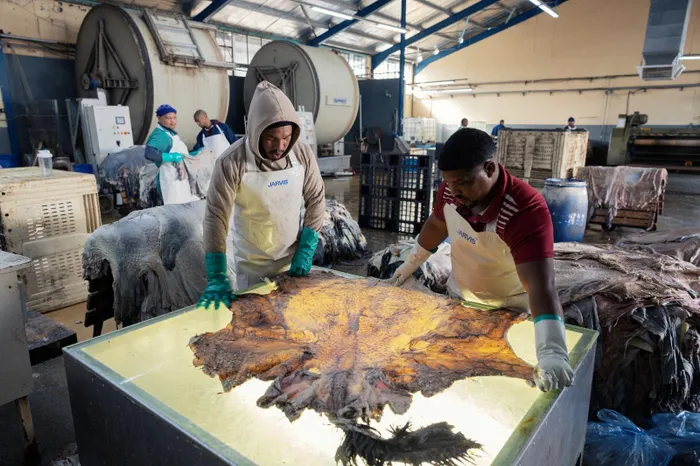Ostrich farmers hope Trump won’t clip SA wings

Factory workers from Cape Karoo International check the quality of incoming ostrich skins at the tannery of the company in Oudtshoorn. In an unusual consequence of Donald Trump's tariffs, cowboy boots "made in the USA" will suffer from the 30% tariff targeting South Africa, which produces the overwhelming majority of the ostrich leather so prized for these boots. The most prestigious Texas brands manufacturing this symbol of Americana source their products exclusively from Oudtshoorn, 400 km east of Cape Town.
Image: GIANLUIGI GUERCIA / AFP
LOCAL ostrich farmers remain hopeful that ongoing talks between South African International Relations and Cooperation, and Trade, Industry and Competition authorities and their US counterparts will lead to a mutually beneficial trade agreement.
This as the 30% unilateral tariffs imposed by the Trump administration on foreign imports is expected to be implemented from Friday if no deal is reached before that deadline.
Texas’s top manufacturers of cowboy boots, a staple of Southern US fashion source their ostrich leather exclusively from Oudtshoorn, widely known as the world’s “ostrich capital.”
The ostrich industry is a major economic driver in the Klein Karoo and the broader Western Cape, with exports of meat, feathers, and leather valued at R578.8 million in 2021.
According to the Western Cape Agriculture department, France, the US, and Mexico were the main export markets for ostrich leather products in 2021, while ostrich feathers and meats were mostly shipped to Hong Kong, China, and the United Kingdom.
Cape Karoo International (CKI) representing around 200 farmers said exports of ostrich leather to the USA account for approximately 20% of its leather sales. AFP reports that luxury handbag manufacturers in France and Italy are also among the CKI's clients.
CKI managing director, Francois de Wet said: “In the United States, our leather is supplied to renowned cowboy boot manufacturers such as Justin Boot, Lucchese, and Anderson Bean.
“Since there is no local ostrich industry in the USA, these manufacturers rely entirely on South Africa for raw material in this case, ostrich leather for their production. We therefore strongly believe that ostrich leather should be exempt from the new tariffs, as there is no domestic alternative and the industry is dependent on imports.”
De Wet said their clients currently had sufficient stock.
“However, in the medium term, we will need to engage with our partners to negotiate how the 30% tariff will be absorbed across the supply chain by us as exporters, the importers, manufacturers in the USA, retail outlets, and ultimately, the American consumer”.
“That said, this is easier said than done. It is simply not possible for us to absorb the full 30% tariff on our own. While we do not anticipate any immediate or medium-term job losses, these tariffs will inevitably hurt Cape Karoo International and if our business suffers, it will affect the entire value chain, including ostrich farmers and, ultimately, farm workers.
“Furthermore, exports of ostrich feathers to the USA represent approximately 14% of our total feather sales. As with leather, we are currently in discussions with our clients in the United States to determine how the newly imposed tariffs will be shared across the supply chain.”
South African Ostrich Business Chamber CEO Piet Kleyn expressed hope that ongoing trade talks between South Africa and the US will lead to a favourable tariff outcome, noting that proposals are still being exchanged.
“By the nature of the matter, this is going to have an impact, especially on the American market, the cowboy boot market. Our exporters are in discussions with their own clients about how they can proceed with this process, because the product is needed on that side. They (the Americans) want the South African product. Our quality is of such a (high standard), and the guys are familiar with us; they’ve been using it for many years already, and we believe that will count in our favour going forward. It’s not something you can easily find elsewhere in the world, and the quality (elsewhere) isn’t necessarily what they (the Americans) need. So they prefer to use our product
“We believe, hope, and trust that they (the South African government) can still negotiate a better basis for us. For all the industries in South Africa, it's important that they continue with those negotiations, and we wish them strength, and we believe it's possible to reach a better alternative,” said Kleyn.
Ryan Vaughan, CEO of the Rios of Mercedes manufacturer told Al Jazeera: “We can’t raise Ostriches here in the United States to the level, to the quality, we don’t have the meat demand here, we need to partner with countries that can do that and we need to partner with them the right way. So I would challenge our leaders to find those avenues to work with and to bring in those things we just can’t do here in the states.”
Cape Times
Related Topics: